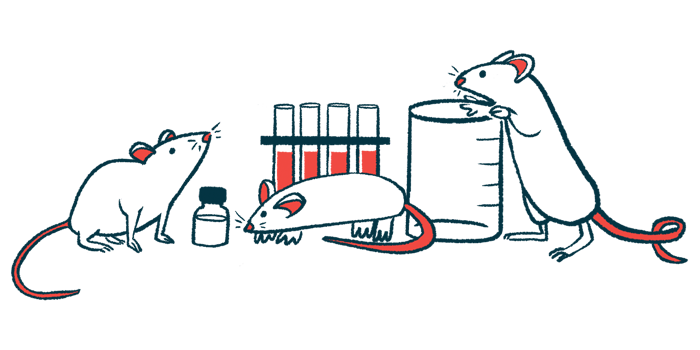Drinking acidified lab water leads to gains in late infantile Batten mice
Mouse model shows improved motor performance, muscle strength, lifespan
Written by |

Drinking acidified laboratory water improved motor performance, restored muscle strength, prevented tremors, and extended survival in a mouse model of late infantile Batten disease, a study reports.
Researchers also noted pronounced changes in gut bacterial composition in Batten mice given acidified drinking water, which might have contributed to its beneficial effects.
“Our study emphasizes that drinking water is a major environmental factor that can alter neurological functions and pathology [disease] in rodent disease models,” the researchers wrote in “Acidified drinking water improves motor function, prevents tremors and changes disease trajectory in Cln2R207X mice, a model of late infantile Batten disease,” which was published in Nature Scientific Reports.
Batten disease, also called neuronal ceroid lipofuscinosis (NCL), refers to a group of inherited neurological conditions marked by the toxic buildup of lipofuscins made up of fats and proteins. The cellular damage caused by this accumulation mainly affects the nervous system and leads to progressive motor and cognitive decline, as well as vision loss and seizures. The disorder is classified into five different types according to age range and severity of Batten symptoms — congenital, infantile, late infantile, juvenile, and adult Batten disease.
Mouse models are used to help understand underlying disease processes and evaluate the impact of potential therapies. Researchers often provide acidified drinking water to mice in research facilities to prevent the spread of bacterial infections. The pH of such water is between 2.5 and 3.0, which is slightly more acidic than orange juice, but less than lemon juice.
In 2019, scientists at the University of South Dakota discovered that a mouse model of juvenile Batten disease (CLN3 disease) drinking acidified water had less severe motor impairment. Then, in 2022, the same research team reported that acidified water improved motor function in an infantile Batten disease (CLN1 disease) mouse model.
Drinking acidified water
Changes in gut bacteria due to the acidified drinking water may explain its beneficial effects in Batten mice, said the researchers, who here investigated whether acidified drinking water had beneficial effects in a mouse model of late infantile Batten disease (CLN2 disease). This model develops motor dysfunction, muscle weakness, and tremors, and dies prematurely between the ages of 4 and 6 months.
Mice were given acidified drinking water generated by a commercial water acidification system, with an average pH of 2.8, or nonacidified water, starting at weaning, and their motor function, muscle strength, and tremors were assessed at three months.
In a vertical pole test that measured agility and motor coordination, CLN2 mice treated with acidified drinking water could climb down the pole with a performance similar to healthy mice receiving nonacidified drinking water. Acidified water didn’t improve the time to turn downward at the top of the pole to assess spatial orientation and motor coordination.
Acidified drinking water restored the muscle strength of CLN2 mice using a wire-hanging test, which measured the time it took to fall. The researchers noted that acidified water prevented the abnormal weight gain seen in untreated CLN2 mice, which suggested “decreased weight was a contributing factor to the increased muscle strength of [CLN2] mice receiving acidified drinking water.”
The animals’ movement and behavior were assessed using a force-plate actimeter, which showed untreated CLN2 mice traveled significantly farther than healthy mice. Although acidified water didn’t affect the distance traveled, it improved stereotypies, such as head bobbing, grooming, rearing, and scratching, along with the area covered, and left- and right-turn counts.
Tremors, apparent in untreated CL2 mice, were prevented with acidified drinking water, a result the researchers considered “surprising.” Acid treatment also extended the survival of CL2 mice by three weeks compared with untreated mice, for about a 20% increase.
Fecal pellets were genetically analyzed at three months to assess the potential effects of acidic water on gut bacteria.
The variability of bacteria within a particular fecal sample (alpha diversity) was similar between CLN2 and healthy mice, with or without acidified water. The variability between mice (beta diversity) was significantly different in CLN2 mice than healthy mice, with or without acidic water. However, acidified water markedly altered the global composition of bacteria in the gut of CLN2 mice, which “might contribute to the improved neurological function and delayed death,” the researchers said.
“Our results show that acidified drinking water had clear beneficial effects in [CLN2] mice,” the authors concluded. “Our study emphasizes that drinking water is a major environmental factor that can alter neurological functions and pathology in rodent disease models.”




